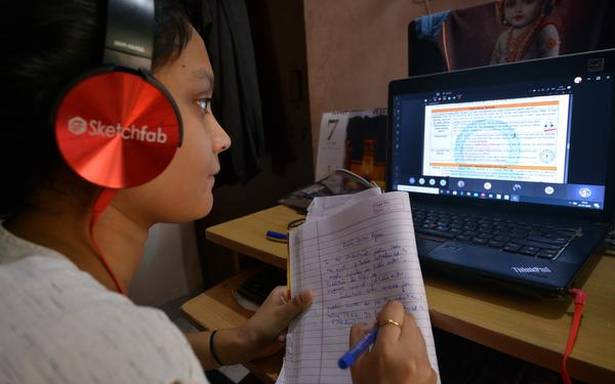Pratichi Trust report highlights the massive impact on the teaching-learning process
About 40% primary school students could not attend online classes during the COVID-19 pandemic owing to the digital divide, a report published by Nobel Laureate Amartya Sen’s Pratichi (India) Trust found. The study was compiled on the basis of experiences shared by hundreds of teachers across 21 State-run primary schools in Kolkata.
The 72-page report highlights the issues faced by students in accessing digital teaching learning.
“There are two components to the digital divide — one is affordability, and whether the families of students can afford devices that are required for digital learning. The second issue is regular accessibility of uninterrupted data, which again has an element of expenditure,” Sabir Ahamed, national research coordinator, Pratichi (India) Trust, and one of the authors of the report said.
The findings are based on experiences over six months during the first wave of the pandemic (April to November 2020) shared by primary school teachers. The study highlights the massive impact on the teaching-learning process, which underwent a sea change after the pandemic.
“So long, the focus was on enrolling as many students as possible and reducing the number of missing children, but the pandemic has brought a situation where the school has gone missing,” the report.
The other contributors to the report include Manabi Majumdar, Urba Chaudhuri, Kakali Das De and Sutapa Ghosh, among others.
According to the teachers, the gaps in learning have widened and are varied due to multiple factors, including the education and income of parents. “For students attending State-run schools, institutional learning was the primary focus. However, the pandemic forced children to depend on their parents for learning support. Since many children are first generation learners, the impact on learning for primary school students was more severe,” Mr. Ahamed said.
The report focused on children enrolled in Classes 1 to 5. While schools continued to provide dry rations regularly as a supplement to cooked mid-day meals, teachers have reported nutritional deficiency. Though more families of school students sought dry rations, the researchers feel that the rations were distributed among family members, and in some cases, the child’s nutritional needs were not met.
Also, during the period surveyed, Kolkata witnessed one of the worst cyclones of the past few decades when Amphan battered south Bengal on May 20, 2020. For more than a couple of weeks, the entire teaching-learning process came to a complete halt due to the lack of digital connectivity.
The report has brought to the fore certain positive outcomes, too, including a rise in environmental awareness among children. While using digital platforms to teach students, teachers also used innovative examples such as the counting of trees and flowers in the students’ surroundings.
“The report provides us with an understanding of how students are left in the digital teaching learning process. If 40% could not access digital classes in Kolkata, one can imagine the situation in remote areas of the State,” Mr. Ahamed said.
Source: Read Full Article

